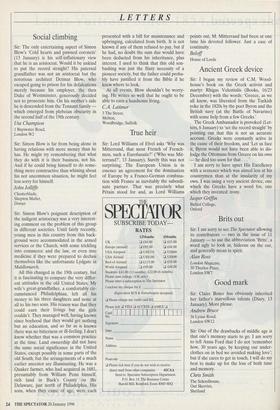Ancient Greek device
Sir: I began my review of C.M. Wood- house's book on the Greek activist and martyr Rhigas Velestinlis (Books, 16/23 December) with the words: 'Greece, as we all know, was liberated from the Turkish yoke in the 1820s by the poet Byron and the British navy (at the Battle of Navarino) with some help from a few Greeks.'
The Greek Ambassador is provoked (Let- ters, 6 January) to 'set the record straight' by pointing out that this is not an accurate account. Greeks were constantly active in the cause of their freedom, and 'Let us face it, Byron would not have been able to dis- lodge the Ottomans from Greece on his own — he died too soon for that . . . '
I am sorry to have upset His Excellency with a sentence which was aimed less at his countrymen than at the insularity of my own. I was using a very ancient device, one which the Greeks have a word for, one which they invented: irony.
Jasper Griffin
Balliol College, Oxford


























































 Previous page
Previous page